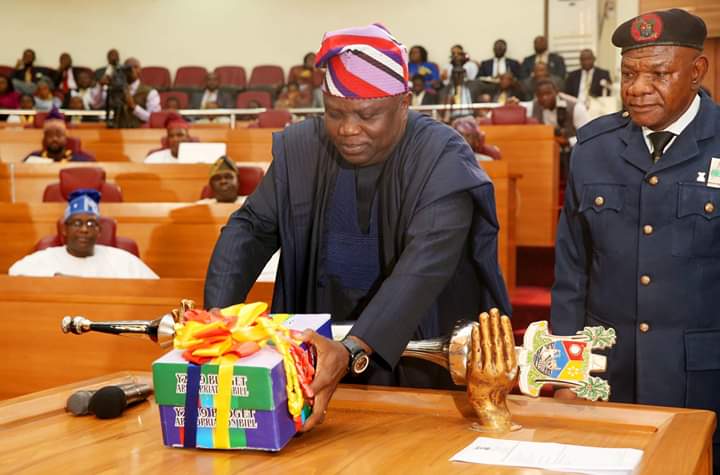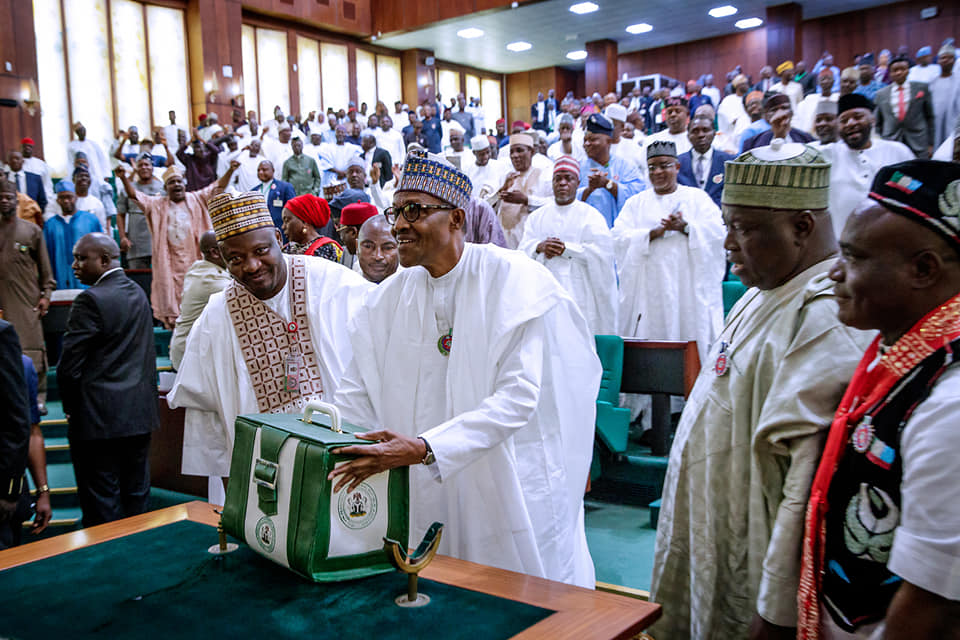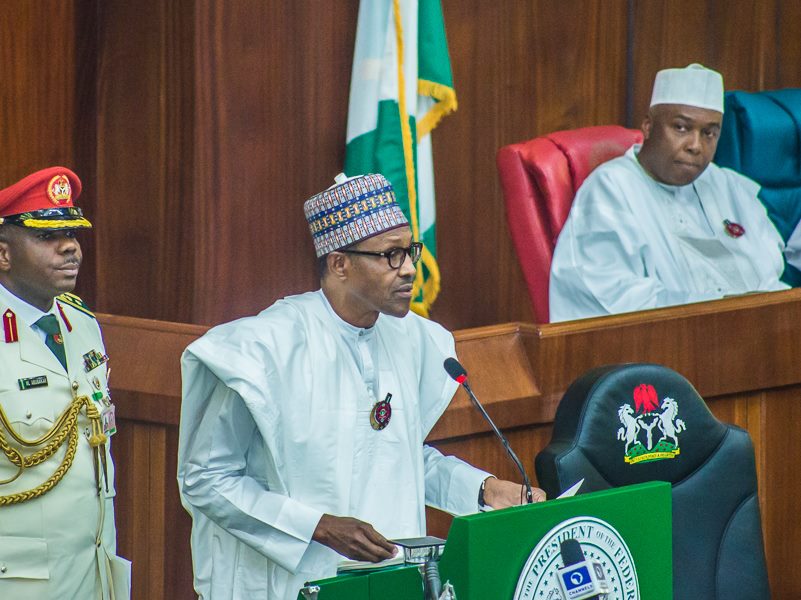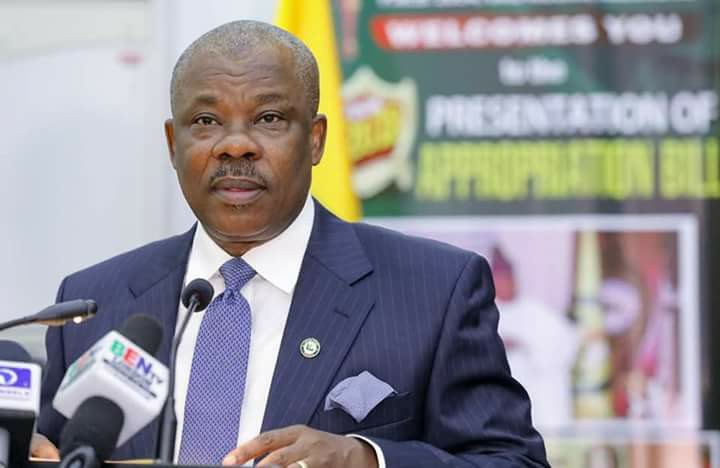Economy
Lagos Targets N775 IGR in N852b 2019 Budget

By Modupe Gbadeyanka
After surviving an Impeachment threat from the Lagos State House of Assembly, Governor Akinwunmi Ambode on Tuesday presented the year 2019 budget proposal of N852.316 billion to the parliament.
During the laying of the fiscal proposal before the lawmakers today, Mr Ambode said the appropriation bill had been carefully prepared to be all-encompassing and dedicated to complete major ongoing projects in the state.
The Governor said N462.757 billion representing 54 percent of the total budget size had been earmarked for capital expenditure, while N389.560 billion representing 46 percent had been dedicated to recurrent expenditure, saying that key projects such as the Oshodi-Murtala Mohammed International Airport Road and Oshodi Interchange Terminal, among others would be completed.
He said from inception of his administration, nine key areas were given priority after careful assessment of the needs of the citizens, adding that such had informed the massive investment in the said sectors which he listed to include security, transport / traffic management, economy -including tourism and agriculture, housing, education, health, infrastructure – social and physical, water, wealth creation – skill acquisition/microfinance, e-Governance and enhanced capacity building, sustainable environment and smart city projects.
Giving details of what informed the budget size, Governor Ambode said the performance of Y2018 budget of N1.046 trillion as at November 2018 stood at 60 percent owing to reduction in revenue projections, while the total revenue stood at N530.192 billion.
According to him, “In the outgoing year, however, we experienced a reduction in our revenue projections, which affected our projected performance and our desired implementation of the Y2018 budget.
“The overall budget performance as at November 2018 stood at 60 percent/N574,206 billion with actual cumulative total revenue of N530,192 billion/64 percent, Capital Expenditure closed at N311,930 billion/49 percent and Recurrent Expenditure performed at N262,276 billion/82 percent.
“In preparing the Year 2019 budget, therefore, we were very mindful of the out-going year performance, the yearnings of our people and the fact that we are going into an election year.
“Consequently, we are today presenting a budget that will be all-encompassing, reflect the level of resources that will be available and with special consideration to the completion of major on-going projects in the state.”
While outlining the key components of the Y2019 budget and the sectoral allocations, the Governor said with priority given to completion of major infrastructure projects and smooth transition to the next administration, the government was proposing a total budget size of ‘N852,316,936,483,’ including a deficit financing of N77.086 billion which is expected to be sourced from internal loans and other sources.
He added: “The projected total revenue for Year 2019 is N775.231 billion, of which N606.291 billion is expected to be generated internally, N168.940 billion is expected from Federal Transfers while a total of N77.086 billion will be sourced through deficit financing within our medium term expenditure framework.
“In 2019, as was with our previous budgets, Economic Affairs still dominates the sectoral allocation of the proposed budget. This is due to our continued focus on the completion of major on-going projects such as: Oshodi-Murtala Mohammed International Airport Road; Agege Pen Cinema Flyover; Phase II of Aradagun-Iworo -Epeme Road, Oshodi Interchange Terminal; completion of JK Randle Complex, Onikan Stadium; Imota Rice Mill; Renovation/Furnishing of Lagos Revenue House, amongst others in order to meet their specified deliverable outcomes without any bias or prejudice to others.”
Expressing optimism that the revenues of the state would improve in 2019, Mr Ambode said the government had begun consolidating on the already established public financial management and technology-driven revenue reforms through data integration and use of multi-payment channels, just as he said that every strata of the society would benefit from the budget.
“The year 2019 budget has been carefully planned to accommodate all and sundry; women, youth and physically challenged, young and old. We will continue to spread development to all part of our state even as we embark on effective transition knowing fully well that the implementation, failure or success of the budget depend on all of us,” he said.
Besides, Governor Ambode commended the Speaker and members of the Assembly for the support accorded his administration in the last three and half years, while also acknowledging the role of royal fathers, religious leaders, members of the business community, professional bodies, development partners, non-governmental organisations, public servants and all residents as well as members of the fourth estate of the realm for their various support and contribution during the lifespan of his administration.
In his remarks, Speaker of the House, Mr Mudashiru Obasa, expressed optimism that the budget would be of great benefit to the people of the state, just as he assured that the House would work with the executive to pass the budget.
Economy
Champion Breweries Concludes Bullet Brand Portfolio Acquisition

By Aduragbemi Omiyale
The acquisition of the Bullet brand portfolio from Sun Mark has been completed by Champion Breweries Plc, a statement from the company confirms.
This marks a transformative milestone in the organisation’s strategic expansion into a diversified, pan-African beverage platform.
With this development, Champion Breweries now owns the Bullet brand assets, trademarks, formulations, and commercial rights globally through an asset carve-out structure.
The assets are held in a newly incorporated entity in the Netherlands, in which Champion Breweries holds a majority interest, while Vinar N.V., the majority shareholder of Sun Mark, retains a minority stake.
Bullet products are currently distributed in 14 African markets, positioning Champion Breweries to scale beyond Nigeria in the high-growth ready-to-drink (RTD) alcoholic and energy drink segments.
This expansion significantly broadens the brewer’s addressable market and strengthens its revenue base with an established, profitable portfolio that already enjoys strong brand recognition and consumer loyalty across multiple markets.
“The successful completion of our public equity raises, together with the formal close of the Bullet acquisition, marks a defining moment for Champion Breweries.
“The support we received from both existing shareholders and new investors reflects strong confidence in our long-term strategy to build a diversified, high-growth beverage platform with pan-African scale.
“Our focus now is on disciplined execution, integration, and delivering sustained value across markets,” the chairman of Champion Breweries, Mr Imo-Abasi Jacob, stated.
Through this transaction, Champion Breweries is expected to achieve enhanced foreign exchange earnings, expanded distribution leverage across African markets, integrated supply chain efficiencies, portfolio diversification into high‑growth consumer beverage categories, and strengthened presence in the RTD and energy drink segments.
The acquisition accelerates Champion Breweries’ transition from a regional brewing business to a multi-category consumer platform with continental reach.
Bullet Black is Nigeria’s leading ready-to-drink alcoholic beverage, while Bullet Blue has built a strong presence in the energy drink category across several African markets.
Economy
M-KOPA Nigeria Plans Expansion to Edo, Others After N231bn Credit Milestone

By Adedapo Adesanya
Emerging market fintech firm, M-KOPA, has announced plans to deepen its reach in Nigeria to the South South and South East regions, starting with Edo this year, after providing N231 billion in credit to over 1 million customers in the country.
The firm released its first Nigeria-focused Impact Report, which showed that Nigeria is M-KOPA’s fastest-growing market and fastest to reach the milestone.
Since its foray into the Nigerian market in 2019, M-KOPA has been working to dismantle barriers to financial inclusion by providing flexible smartphone financing and digital financial tools that align with how people in the informal economy earn and manage their money.
It operates in six states in the country, including Lagos, Ogun, and Oyo, among others.
The report highlights the company’s contribution to income generation, digital inclusion and economic opportunity for Every Day Earners across the country.
The report showed that M-KOPA has enabled 290,000 first-time smartphone users, while 56 per cent of agents accessed their first income opportunity through the platform.
It showed high income and livelihood gains among its users, with about 77 per cent of customers leveraging smartphones or digital loans obtained through the platform to generate income, indicating that access to financed devices is directly supporting micro-entrepreneurial activity and informal sector productivity.
Furthermore, 75 per cent of users report higher earnings since gaining access to M-KOPA’s services, suggesting measurable improvements in personal revenue streams. On the distribution side, 99 per cent of agents disclose increased earnings, reflecting positive spillover effects across the company’s value chain.
In addition, 81 per cent of long-term customers state that their household expenses have improved, pointing to enhanced financial stability and better consumption smoothing over time.
Speaking on the report, Mr Babajide Duroshola, General Manager, M-KOPA Nigeria, said, “Nigeria represents extraordinary potential, and we’re proud that it has become M-KOPA’s fastest-growing market. Our Impact Report shows that when Every Day Earners gain access to the right digital and financial tools, they use them to create stability and long-term progress for their families. This is about access that unlocks opportunity and sustained prosperity.”
On its expansion plans Nigeria-wide, the M-KOPA helmsman said, “Many of the states we are considering are already similar to the ones we are currently in proximity… So, there is proximity and similarity between these states, and that’s what we are going to do, starting with Edo.”
He noted that as M-KOPA Nigeria continues to expand, the focus remains on ensuring more everyday earners gain access to the digital and financial tools they need to build resilient, prosperous futures in Nigeria’s rapidly digitising economy.
Economy
Tinubu Okays Extension of Ban on Raw Shea Nut Export by One Year

By Aduragbemi Omiyale
The ban on the export of raw shea nuts from Nigeria has been extended by one year by President Bola Tinubu.
A statement from the Special Adviser to the President on Information and Strategy, Mr Bayo Onanuga, on Wednesday disclosed that the ban is now till February 25, 2027.
It was emphasised that this decision underscores the administration’s commitment to advancing industrial development, strengthening domestic value addition, and supporting the objectives of the Renewed Hope Agenda.
The ban aims to deepen processing capacity within Nigeria, enhance livelihoods in shea-producing communities, and promote the growth of Nigerian exports anchored on value-added products, the statement noted.
To further these objectives, President Tinubu has authorised the two Ministers of the Federal Ministry of Industry, Trade and Investment, and the Presidential Food Security Coordination Unit (PFSCU), to coordinate the implementation of a unified, evidence-based national framework that aligns industrialisation, trade, and investment priorities across the shea nut value chain.
He also approved the adoption of an export framework established by the Nigerian Commodity Exchange (NCX) and the withdrawal of all waivers allowing the direct export of raw shea nuts.
The President directed that any excess supply of raw shea nuts should be exported exclusively through the NCX framework, in accordance with the approved guidelines.
Additionally, he directed the Federal Ministry of Finance to provide access to a dedicated NESS Support Window to enable the Federal Ministry of Industry, Trade and Investment to pilot a Livelihood Finance Mechanism to strengthen production and processing capacity.
Shea nuts, the oil-rich fruits from the shea tree common in the Savanna belt of Nigeria, are the raw material for shea butter, renowned for its moisturising, anti-inflammatory, and antioxidant properties. The extracted butter is a principal ingredient in cosmetics for skin and hair, as well as in edible cooking oil. The Federal Government encourages processing shea nuts into butter locally, as butter fetches between 10 and 20 times the price of the raw nuts.
The federal government said it remains committed to policies that promote inclusive growth, local manufacturing and position Nigeria as a competitive participant in global agricultural value chains.
-

 Feature/OPED6 years ago
Feature/OPED6 years agoDavos was Different this year
-
Travel/Tourism10 years ago
Lagos Seals Western Lodge Hotel In Ikorodu
-

 Showbiz3 years ago
Showbiz3 years agoEstranged Lover Releases Videos of Empress Njamah Bathing
-

 Banking8 years ago
Banking8 years agoSort Codes of GTBank Branches in Nigeria
-

 Economy3 years ago
Economy3 years agoSubsidy Removal: CNG at N130 Per Litre Cheaper Than Petrol—IPMAN
-

 Banking3 years ago
Banking3 years agoSort Codes of UBA Branches in Nigeria
-

 Banking3 years ago
Banking3 years agoFirst Bank Announces Planned Downtime
-

 Sports3 years ago
Sports3 years agoHighest Paid Nigerian Footballer – How Much Do Nigerian Footballers Earn
















